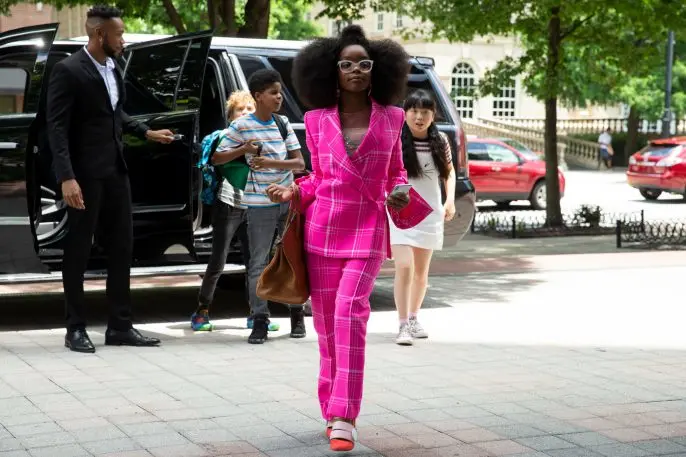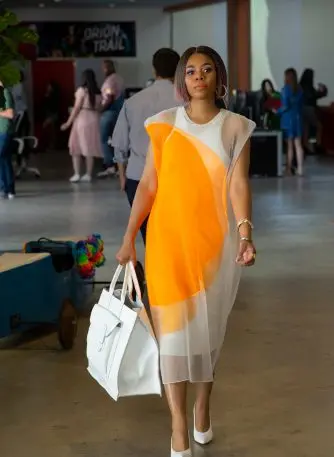In the new comedy Little, Regina Hall stars as Jordan Sanders, a tyrannical CEO who tramples everything and everyone in her path–including her assistant April (Issa Rae). However, Jordan gets her comeuppance in the form of a curse that reverts her back to her 13-year-old self (Marsai Martin)–think the Tom Hanks classic Big but in reverse.
Amid the magic spells and farcical shenanigans, there’s a small detail that shouldn’t be glossed over: Jordan is a black woman running a tech company.
It’s not significant to the plot at all–Jordan could’ve been a boss from hell at any company. But the fact that she runs a powerful app development startup is a glimmer of hope in an otherwise dismal state of occupations for female characters in film and TV.
A 2015 study found that the top three occupations for women in movies were nurse (89%), secretary (81%), and teacher (57%); the bottom three were engineer (5%), president (5%), and solider (3%). The Center for the Study of Women in Television and Film also put out a study in 2018 that showed male characters not only had more identifiable occupations than female characters in film (76% vs. 62%), they were also seen more in their actual work setting (62% vs. 46%).
And it would seem that in this case, truth is more depressing than fiction.
A 2017 report found that in the tech space, “the percentage share of black female workers has declined despite diversity initiatives aimed at hiring more underrepresented minorities in tech. Between 2007 and 2015 there has been a 13% decrease in the number of black women professionals.”
Knowing that female characters so often are given stereotypical occupations, Little writer Tracy Oliver decided to lean in a different direction. As a Stanford University grad, Oliver says she was surrounded by “tech geeks,” giving her the foundation of how to build the world of Jordan Sanders Industries authentically. The founders of Snapchat and Instagram were in her dorm. Elizabeth Holmes was a sophomore when Oliver was a first-year.

An early draft of the script had Jordan just working in a tech company, but director Tina Gordon, who initially came onto the project as a fellow writer, promoted Jordan to the C-suite.
“As I was crafting this boss character, it didn’t make sense that she was beholden to anyone in the office,” Gordon says. “I feel like her character would really have had to push her way in to make space for herself in that field.”
Even Issa Rae’s character April subverts her role as an assistant, working on an app she developed on the side that she spends the whole movie working up the nerve to pitch to Jordan.
“I wanted something that encouraged women to go into that field, that looked fun, that looked creative,” Gordon says.
Little does well in showing a vibrant tech culture, but the narrative of Jordan pushing through the boys club to the top of her own company skated the line of the angry black woman archetype.
“We didn’t want to do a stereotypical character. We’ve seen the over-the-top bitchy female boss,” Oliver says. “And so if we don’t delve into this backstory and see how she became that way, then the movie’s not going to have any heart.”
That empathy stems from Little‘s main theme of bullying.

“The advantage of working in Hollywood is you see a lot of those personality types up close and personal. So I had seen a lot of real-life Jordans,” Oliver says. “People are always like, ‘Who hurt you?’ We can say that and we laugh, but I really do think that, unless you’re just a complete sociopath, 99% of people that have extreme personality disorders, there’s a backstory there.”

“I know that kind of imagery makes people think, ‘I can see myself in that. I want to see myself in that.’ It’s powerful,” Gordon says. “My hope is women, young girls see that and are intrigued by it. Even in the smallest way, I would be beyond pleased.”
Oliver adds, “There wasn’t a big variety of portrayals when I was growing up, so I actually had this very limited idea of what I could be. There are so many careers that people just don’t know about if they’re not seeing them on TV,” she says. “I think that art, because it is so global, is the easiest way to send people a message and educate them. And you won’t even have to like do it in a really didactic way–you just have to show someone in a cool world.”
Recognize your brand’s excellence by applying to this year’s Brands That Matter Awards before the early-rate deadline, May 3.
